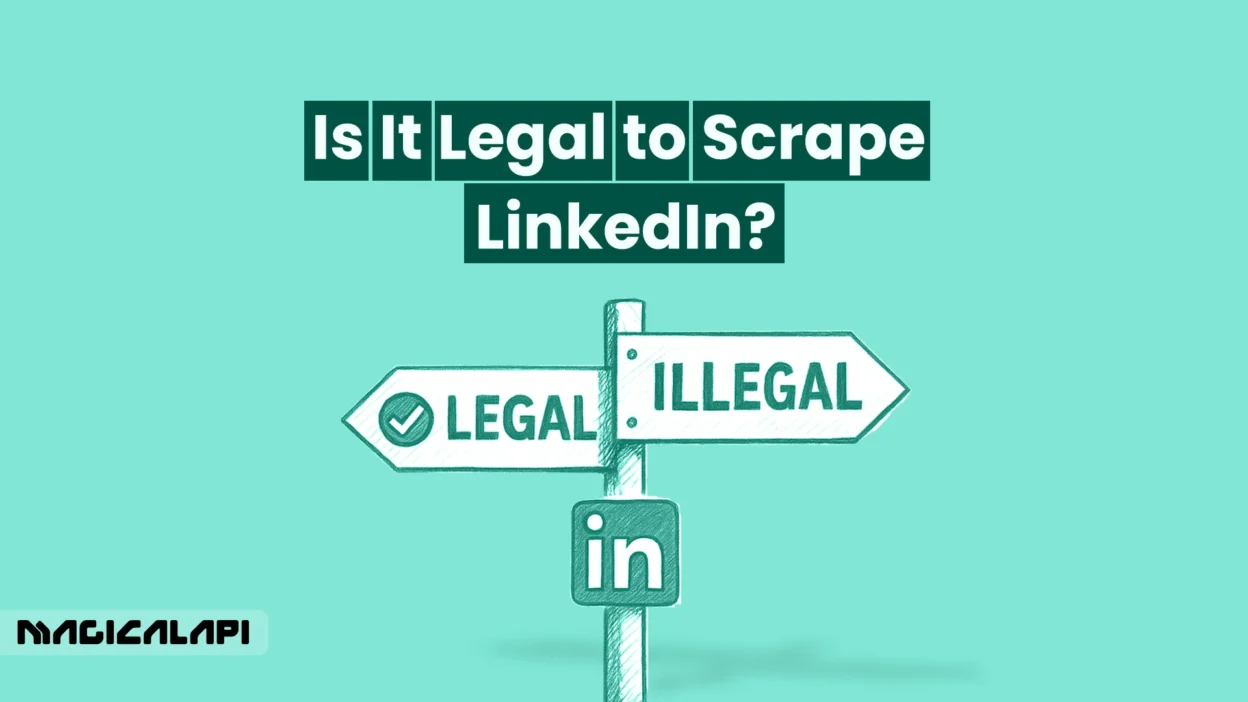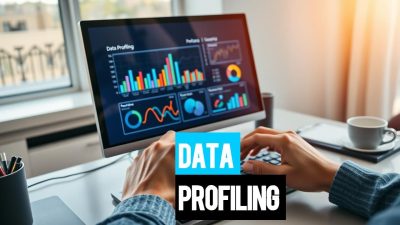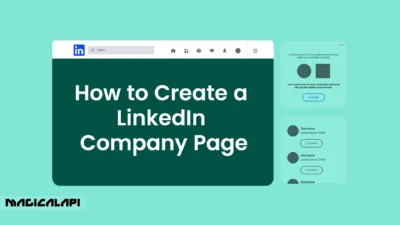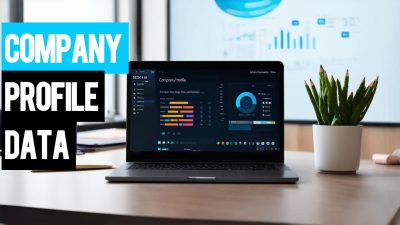Is It Legal to Scrape LinkedIn? Uncover the legal nuances of LinkedIn data scraping in our blog. Understand the necessary permissions and ethical considerations for compliant data gathering from LinkedIn, ensuring you stay informed and compliant with the law.
In the realm of digital data and social networking, LinkedIn has emerged as a powerhouse of professional information. This has naturally given rise to a surge in the use of LinkedIn scrapers – tools designed to extract valuable data from LinkedIn profiles. However, accessing this data through scraping tools raises important questions about privacy, consent, and compliance with legal standards.
The platform itself has established clear policies and terms of service regarding the use of automated tools like scrapers, often resulting in legal disputes and debates about data ownership, privacy rights, and broader questions surrounding LinkedIn scraping legal boundaries.
Table of Contents
What is Data Scraping?
Before delving into the legality of scraping LinkedIn, it is essential to understand what web scraping entails and the legal implications associated with it. Web scraping refers to the process of extracting data from a website or online platform. When it comes to LinkedIn scraping, this involves gathering specific information with LinkedIn Company Scraper, which could include details like names, job titles, educational backgrounds, skills, and professional connections.
LinkedIn, like many other social media platforms, has policies and terms of service that restrict the use of automated tools to scrape data from their site. These restrictions are in place to protect user privacy and proprietary data.
LinkedIn Company Scraper - Company Data
Discover everything you need to know about LinkedIn Company Scraper , including its features, benefits, and the various options available to streamline data extraction for your business needs.
What Are LinkedIn’s Terms of Service Regarding Scraping?
LinkedIn’s terms strictly forbid scraping. According to their policy, users and bots may not “scrape, crawl, or use any automated means to access the services.” This includes both public and private data. Violating these terms can result in your account being suspended or banned, and in some cases, LinkedIn may pursue legal action, especially if scraping involves bypassing protective measures or targeting sensitive information.
While many debates have emerged around the LinkedIn scraping legal question, one thing is clear: even if it’s not always deemed illegal in court, it’s still a direct violation of LinkedIn’s rules, and that alone carries serious risk.
Key Points to Know:
linkedin terms of service scraping
LinkedIn explicitly bans the use of third-party scraping tools, bots, and automation. Their User Agreement clearly states that users are not allowed to “scrape, crawl, or use any automated means” to access any part of the platform. Violating these terms can immediately disqualify a scraping activity from being considered LinkedIn scraping legal in the eyes of LinkedIn.
Automation Risks
Automated actions, such as sending bulk messages, downloading large contact lists, or simulating normal user behavior at scale, are also prohibited. These actions can trigger detection mechanisms, result in your account being restricted or banned, and put your project at legal risk.
Security Bypass Issues
Many scraping tools attempt to bypass LinkedIn’s built-in security limits, such as the number of profile views or searches allowed. Courts have previously ruled that scraping public data may not always violate CFAA, but scraping that bypasses authentication or technical barriers is far less likely to be seen as LinkedIn scraping legal.
LinkedIn scraping legal issues
Even if you avoid security bypasses, scraping LinkedIn data can still lead to serious consequences. Legal actions may include cease-and-desist letters, lawsuits for breach of contract, or claims under anti-circumvention laws like the DMCA. If you’re wondering, “Is LinkedIn scraping legal if I only collect public data?” the answer is still: LinkedIn data scraping legality not without risk.
Public Data Isn’t Always Safe to Scrape
A common misconception is that if data is publicly accessible, it’s legal to collect. However, LinkedIn’s terms still apply to public profile information. Courts are still debating these nuances, but from a platform policy standpoint, LinkedIn scraping legal defenses are weak even when the data is public.
Ethical and Privacy Considerations
Legalities aside, scraping without user consent raises ethical red flags. LinkedIn users expect some level of privacy and control over their data, even if it’s publicly listed. Collecting data without permission can violate user expectations, harm trust, and spark privacy concerns. In an era of growing data protection laws like GDPR and CCPA, ignoring ethical practices can have real-world consequences.
The Safe and Legal Alternative: LinkedIn API
If you want to stay compliant and avoid legal risks, the safest route is to use LinkedIn’s official API. The API allows limited access to user and company data under strict permissions and with user consent. If your project requires data from LinkedIn, using the API ensures that you’re operating within both ethical and legal boundaries, making your approach truly LinkedIn scraping legal.
Use Cases of Scraping LinkedIn
Is It Legal to Scrape LinkedIn? LinkedIn scraping has various applications within legal boundaries, offering benefits to businesses and professionals. Key uses include:
- Recruitment: Speeds up candidate identification by analyzing profiles for job matching. By extracting information such as work history, skills, and educational background, they can quickly identify and reach out to individuals who match specific job criteria, streamlining the recruitment process.
- Lead Generation: Helps sales and marketing teams find potential clients by extracting profile data.
- Market Research: Provides insights into industry trends and employment patterns for strategic planning.
related: Benefits of Using a LinkedIn Profile Scraper for Targeted Marketing Campaigns - Networking: Aids in finding potential business partners and expanding professional networks. LinkedIn profile scraping can aid in identifying potential business partners, investors, or industry influencers.
- Academic Research: Supports studies on employment trends and workforce planning.
- Personal Branding: Allows individuals to refine their online presence and career strategies.
It’s essential to scrape responsibly, adhering to legal standards and LinkedIn’s terms.
Common Arguments for Web Scraping
To understand the arguments surrounding the legality of scraping LinkedIn, it is essential to examine the perspectives of both web scrapers and platforms like LinkedIn. Web scrapers often argue that scraping publicly available data is akin to accessing information freely available on the internet. They contend that web scraping enables data-driven decision-making, facilitates research, and drives innovation.
On the other hand, platforms like LinkedIn raise concerns about data privacy, intellectual property rights, and the potential misuse of scraped data. They argue that scraping can lead to unauthorized access, and copyright infringement, and undermine the integrity of their platforms. Balancing these arguments is crucial in determining the legality of scraping LinkedIn and other platforms.
Limitations and Challenges of linkedin scraping policy
While scraping LinkedIn can provide valuable data and insights, there are certain limitations and challenges associated with this practice. LinkedIn has implemented measures to prevent scraping and protect its users’ data, which can pose significant hurdles for web scrapers.
One major limitation is the restriction on the number of profiles that can be scraped per user. LinkedIn imposes a limit of 50 profiles per day, and exceeding this limit can result in account suspension or other consequences. Additionally, LinkedIn employs various techniques, such as captchas, to detect and prevent automated scraping activities.
Another challenge is the dynamic nature of LinkedIn’s website structure. LinkedIn frequently updates its website layout and implements anti-scraping measures, making it challenging to maintain scraping scripts and ensure consistent data extraction. Web scrapers need to constantly adapt their scraping methods to stay ahead of these changes and avoid detection.
Read More: How to Do LinkedIn Data Scraping?
So, Is It Legal to Scrape LinkedIn?
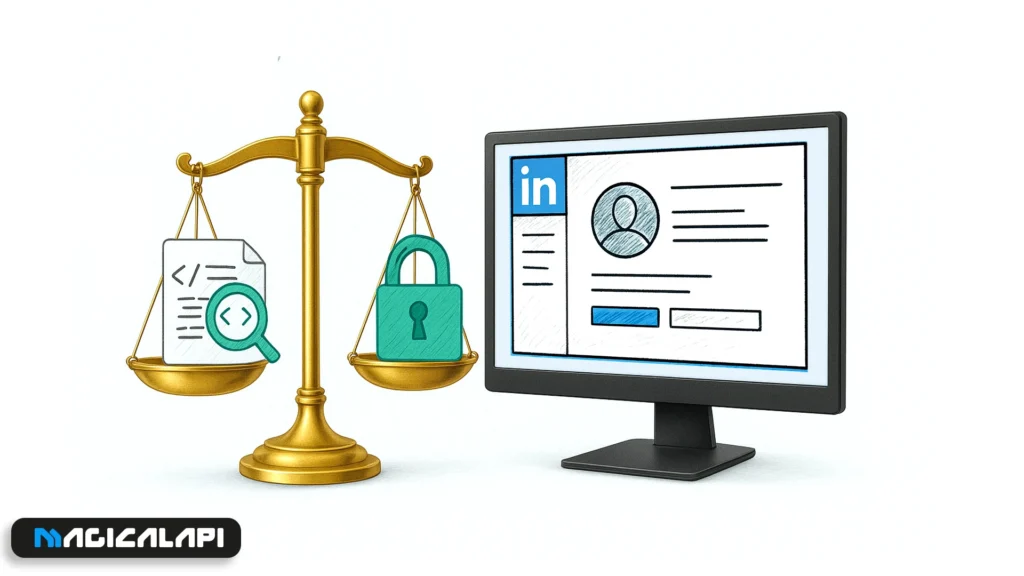
As we mentioned above, The legality of using a LinkedIn scraper is a question that doesn’t have a straightforward answer, as it hinges on multiple factors including the method of data collection, the type of data being scraped, and the jurisdiction’s legal standards.
- LinkedIn’s Stance and Legal Precedents: LinkedIn’s Terms of Service clearly prohibit the use of automated tools like scrapers to extract data from the platform. There have been notable legal cases where LinkedIn has pursued legal action against entities that have used scrapers to harvest data from its site. These cases often revolve around the Computer Fraud and Abuse Act (CFAA) in the United States, which prohibits accessing computer systems without authorization.
- Is It Legal to Scrape LinkedIn? Public vs. Private Data: The legality of scraping can also depend on whether the data is public or private.
- Is It Legal to Scrape LinkedIn? Data Protection Laws: Various jurisdictions have their own data protection laws, like the GDPR in the European Union, which impose stringent rules on data collection and processing. These laws require explicit consent for collecting personal data, which complicates the legality of using LinkedIn scrapers without user consent.
- Is It Legal to Scrape LinkedIn? LinkedIn’s API as an Alternative: For those seeking to access LinkedIn data legally, LinkedIn’s API provides a more compliant route. Accessing data through LinkedIn’s API involves adhering to their usage policies and often requires LinkedIn’s express permission, thus aligning with legal and ethical standards.
In summary, while technology like a LinkedIn scraper provides the capability to extract vast amounts of data, its legality is not black and white. The scraping LinkedIn legality hinges on how the scraping is done. Scraping public LinkedIn profiles is generally considered legal. However, practices like using fake accounts to log in and scrape LinkedIn profiles can be illegal.
What Legal Risks Do You Face If You Scrape LinkedIn?
Even if scraping public data isn’t always a federal crime, scraping LinkedIn can expose you to multiple legal risks:
- Breach of Contract: If you’re logged in and scraping with an account, you’re bound by LinkedIn’s user agreement. Breaking it can lead to lawsuits.
- CFAA Violation: Using tools that bypass authentication or rate limits can be interpreted as unauthorized access, which may violate the Computer Fraud and Abuse Act.
- DMCA and Anti-Circumvention: If your scraping methods bypass security features, you could be violating copyright and anti-circumvention laws.
- Cease and Desist Orders: LinkedIn actively sends these to parties they believe are violating their terms, and ignoring them increases legal risk.
LinkedIn’s Terms of Service and User Agreements
LinkedIn’s Terms of Service explicitly restrict certain forms of data collection, including the use of automated systems to access or scrape their site. By joining LinkedIn, users agree to abide by these rules, and any scraping activity—even of publicly available information—can be seen as a breach of contract with the platform.
While the enforcement of these terms typically focuses on protecting LinkedIn’s proprietary systems and data integrity, violating them can lead to account suspension or legal action from the company, even if the scraped data itself is publicly visible.
Legal Considerations: The CFAA and Beyond
The Computer Fraud and Abuse Act (CFAA) in the United States is one of the key laws potentially implicated in unauthorized scraping activities. Under the CFAA, accessing a computer system without authorization, or in a manner that violates the site’s terms, may be considered illegal. However, there is significant debate about what constitutes “unauthorized access” when the data in question is publicly accessible.
Courts have at times drawn fine distinctions between technical access restrictions and contractual limitations, meaning that while scraping public data might not trigger CFAA penalties, it can still fall foul of contractual breaches related to authorized use.
Read More: How to Cancel LinkedIn Sales Navigator in Minutes?
Key Legal Precedents: The hiQ Labs v. LinkedIn Case
One of the most influential legal cases in this area is hiQ Labs v. LinkedIn. In this case, hiQ Labs, which scraped publicly available LinkedIn profiles for analysis, argued that the information was openly accessible and therefore not subject to the same protections as data behind a login.
A court ruling in favor of hiQ suggested that scraping public data does not necessarily violate the CFAA. However, this decision does not constitute blanket permission for all scraping activities on LinkedIn since it focused on publicly available data. Moreover, this case is one of several that underline the complexity of balancing terms of service with federal law, and its implications continue to be debated in legal circles.
The Future of Data Scraping and Privacy Laws
The future of data scraping, particularly with tools like LinkedIn scrapers, is poised at a crucial juncture. This future is shaped by a growing awareness of privacy rights, technological advancements, and the changing legal frameworks that govern data usage. Understanding these dynamics is essential for anyone involved in data scraping, as it will influence how tools like LinkedIn scrapers are utilized and regulated.
- Increased Focus on User Privacy: The global conversation around data privacy is intensifying, with users becoming more aware of their digital rights. This shift is leading to stricter privacy laws and regulations, such as the General Data Protection Regulation (GDPR) in the European Union and the California Consumer Privacy Act (CCPA) in the United States.
These laws mandate greater transparency and user consent in data collection and usage, directly impacting data scraping practices. - Advancements in Data Protection Technologies: As privacy concerns grow, so do the technologies designed to protect user data. Platforms like LinkedIn are likely to implement more robust anti-scraping measures, making it more challenging to extract data without explicit permission. This technological tug-of-war will continue to shape the feasibility and methods of data scraping.
- Legal and Ethical Compliance as a Priority: The future of data scraping will see a heightened emphasis on legal and ethical compliance. Businesses and individuals using LinkedIn scrapers will need to stay abreast of legal developments and ensure that their data scraping practices are transparent, lawful, and ethical. This may involve seeking explicit consent from data subjects or limiting scraping to publicly available data.
- Innovations in Consent-Based Data Access: We may see innovations in how consent is obtained and managed for data scraping purposes. This could include more sophisticated consent management platforms or new methodologies for ensuring that data scraping adheres to user preferences and legal requirements.
- Potential for New Legislation and Legal Precedents: We can expect new laws and legal precedents that specifically address the nuances of data scraping, potentially reshaping its legal boundaries. Businesses using LinkedIn scrapers will need to stay informed and adaptable to these changes.
- Ethical Data Scraping Practices Will Be Key: The focus will increasingly shift toward ethical data scraping practices. Companies will need to balance their data collection goals with respect for user privacy, opting for approaches that are transparent and responsible.
In conclusion, the future of data scraping, particularly about LinkedIn and similar platforms, will be heavily influenced by the evolving discourse on privacy rights, legal developments, and technological advancements.
The use of LinkedIn scrapers and other data-extraction tools will be necessary to navigate these changes, while prioritizing compliance, ethical considerations, and respect for user privacy. As these dynamics unfold, the landscape of data scraping will continue to evolve, presenting new challenges and opportunities for businesses and individuals alike.
Conclusion: Is it legal to scrape data from LinkedIn
The exploration into the world of LinkedIn data scraping and LinkedIn scraping legal, marked by its legal complexities and ethical considerations, brings us to a crucial understanding: while the allure of accessing vast professional data through a LinkedIn scraper is strong, it must be balanced with adherence to legal boundaries and respect for privacy.
Navigating the legal landscape of LinkedIn scraping requires a careful, informed approach. As we’ve seen, the implications of disregarding LinkedIn’s Terms of Service or privacy laws can be significant, ranging from legal challenges to reputational damage. The key is to pursue data collection methods that are ethical, compliant, and respectful of user privacy.
In this evolving digital era, where data is invaluable, there are alternatives to scraping LinkedIn that can provide businesses with the insights they need without the associated legal risks. Our services at MagicalAPI, including Profile Data and Company Data, offer a viable solution. These services provide comprehensive and legally compliant access to professional data, helping businesses achieve their objectives in market research, talent acquisition, lead generation, and competitive analysis.
By choosing our Profile Data and Company Data services, you can bypass the complexities and risks of using a LinkedIn scraper. Our services ensure you get the valuable data you need while staying within the legal and ethical boundaries. With MagicalAPI, you can harness the power of professional data effectively and responsibly, driving your business strategies forward with confidence and peace of mind.
FAQ For is it legal to scrape data from linkedin
Is it legal to scrape data from LinkedIn?
Scraping data from LinkedIn without authorization is generally considered a violation of LinkedIn’s User Agreement, which explicitly forbids the use of automated tools to extract data from their platform. While scraping publicly available data is not inherently illegal under U.S. law, it can still lead to legal consequences if it violates LinkedIn’s terms of service.
Can LinkedIn ban you for scraping data?
Yes, LinkedIn can and does ban users who are caught scraping data without permission. Their systems are designed to detect unusual scraping activities, such as high-volume profile viewing in a short period, and can lead to account suspension or permanent bans.
Are There Legal Alternatives to Scraping LinkedIn?
Yes. Instead of scraping, consider using LinkedIn’s official APIs, such as the LinkedIn Marketing Developer Platform, which offer structured access to user and company data with proper permissions. While LinkedIn APIs have strict limitations and approval processes, they’re the only officially sanctioned method for extracting LinkedIn data.
Other ethical alternatives include using public datasets, B2B contact databases, or data enrichment services that have data collection policies compliant with privacy regulations like GDPR and CCPA.
What Should You Know Before Using LinkedIn Scraping Tools?
Before using any LinkedIn scraping tool, understand that most violate LinkedIn’s terms and could put your business or project at legal risk. Even tools labeled as “safe” or “compliant” may trigger detection systems, especially if they’re automating logins or making high-frequency requests.
If you choose to use such tools, do so at your own risk, and consult a legal advisor to understand the potential consequences. It’s also wise to anonymize the data and avoid collecting personal identifiers without user consent.
Is Job scraping legal?
Job scraping can be legal if you’re collecting publicly available data without bypassing security measures or violating a website’s Terms of Service. However, many job boards explicitly ban scraping, and ignoring these terms can lead to legal risks like account bans or lawsuits.
To stay compliant, use official APIs or get permission when possible. Even public listings can be protected by copyright or data privacy laws, so it’s best to avoid scraping at scale without clear legal guidance.


